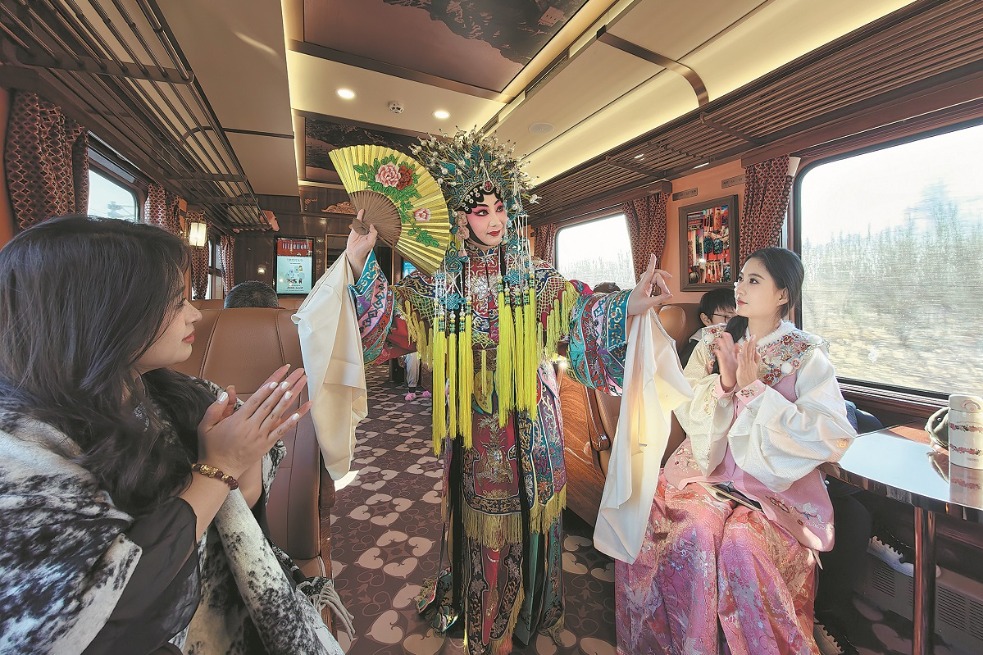A family affair

Chinese hotel and restaurant owner reflects on 38 years of doing business in Kenya
When Ken H.K. Sam left Foshan city, Guangdong province, for Kenya in early 1978, China had yet to initiate its opening-up and reform policy. He says he was probably the second Chinese national, after one of his sisters, who went to Kenya after the founding of the People's Republic of China. "China was too poor then," says the 60-year-old.
He recalls that China lacked a highway comparable to the six-lane Uhuru highway, which connects Kenyatta International Airport with Nairobi's downtown area.
| Ken H.K. Sam practices tai chi at his hotel, Baobab Holiday Resort in Mombasa, Kenya. Photos provided to China Daily |
| The swimming pool area at hotel Baobab Holiday Resort. |
The highest building in Guangzhou, the third-largest city in China, had 27 stories, one less than the Kenyatta International Conference Centre in Nairobi. There was also no revolving restaurant in Guangzhou like the one in KICC, says the restaurant and hotel owner, who lives in the coastal city of Mombasa.
Sam says the Chinese were a rare sight in Kenya and were therefore unfamiliar to Kenyans; there were perhaps no more than 100 Chinese nationals in the country when he first arrived. "They might ask if you were Japanese or Korean, but they wouldn't ask if you're Chinese," he says.
But he says that Kenya had a harmonious society and that there was no ill will toward foreigners.
Things have changed since Sam journeyed to Kenya in 1978. These days the number of Chinese nationals in Nairobi alone is estimated to be more than 30,000.
Talking at the dinner table in his hotel, Baobab Holiday Resort, Sam says he could have chosen to stay in China and apply for residency in Hong Kong, where his grandmother and uncle lived, instead of going to a country almost 9,000 kilometers away. But he was determined to go.
"I didn't think too much about it then. My aunt asked me to come, so I did. I was very eager to go abroad.The aunt Sam mentions had been in Africa since 1937, and her husband came to Africa even earlier, in 1914.
Sam had been working as a repairman for three years when he decided to leave China. Before that he was a zhiqing - an educated youth sent to live and work in the countryside, during the "cultural revolution" (1966-76), for three and a half years after graduating from high school aged 19.
Sam's life was not easy after he came to Kenya. But instead of dwelling on sad memories with long and moving tales, the slim but energetic man chooses to give a very short account of his 38 years in Kenya and uses very few adjectives during a two-hour conversation with China Daily.
"Everybody has stories and has experienced difficulty at some point or another. What I feel proud of and confident about is that I started from scratch. This makes me fully at ease," says Sam.
Sam worked for his aunt for the first four years. She came to Kenya from South Africa in 1951 and had opened several restaurants in Mombasa and Nairobi before he arrived. Sam says his aunt was the first Chinese national to open a Chinese restaurant in Kenya.
"The outsiders might have thought I was also a boss, but I was only an employee. My aunt was very tough, and that is an unforgettable experience for me. But a strict teacher produces outstanding students," he says.
He learned how to do business and accumulated some money while also working for his aunt. "I did some small business and trade. I was just like a vendor then. I bought and sold and sometimes charged some referral fee."
He spoke no English and did not know how to drive. Again, he started from scratch. "While the others slept for eight hours (a day), I slept for six. Except for work, I spent the rest of my time learning English and trying to know more about the market."
Sam opened his first eaterie, Galaxy Chinese Restaurant in Mombasa, in his fifth year in Kenya. It is open to this day.
In 1995, he opened Gold Chopsticks at Baobab Holiday Resort.
He says there were few Africans customers in the early days, but that Africans now account for 30 percent of his business. "If there are no African customers, we are not busy."
Sam, whose Chinese name is Cen Haojiang, became a Kenyan national. "It was hard to get a business licence if you didn't have Kenya nationality. And you couldn't have a 100-percent share of a company, only 49 percent. I had no choice but to get Kenyan nationality."
He says one habit he has kept to this day is to practice tai chi and yongchun, two kinds of Chinese kung fu, in the evening.
Sam has a good memory and looks much younger than he is. He reels off a list of dates as if he has remembered them from a history book.
"My second older sister came three months earlier (to Kenya) than me; my second older brother came in 1979; my eldest brother in 1985 and eldest sister in 1991. My parents came in 1985". His sisters and brothers all opened Chinese restaurants in Kenya.
"When I came to Kenya, there were five Chinese restaurants in Nairobi and two in Mombasa. Four of them were run by my family members. When there were about 20 Chinese restaurants in Kenya, the number of restaurants run by my relatives reached nine, and three of them were mine," he says.
His siblings and parents have all now left Kenya. Together, he and his siblings have seven children; Sam has a daughter and son. Neither wanted to work in the family catering business, following in their father's footsteps, and they, too, have left Kenya.
The catering and hospitality industry in Mombasa faces a bigger problem and a harsh winter, with the number of tourists plunging after the terrorist attacks at Nairobi's Westgate Shopping Mall in 2013, which killed at least 67 people, and Garissa University College in Garissa this year, when 148 died.
"This should have been high season. However, there are very few tourists and the number during the off-peak season is also lower than before," he says.
"Our business mainly relies on tourist groups and those groups that come for conferences. The other kinds of customers account for no more than 20 percent of the total. The situation was bad last year, and I can feel it is obviously bad this year, too.
"Now I will continue for as long as I can, depending on my health and if the environment is favorable. If we have enough business, I will continue," Sam says.
"I like it. Only when you like it can you make your business long-term and ongoing. I have been in the business for 37 years and I have never been sick of it."
houliqiang@chinadaily.com.cn
(China Daily Africa Weekly 07/31/2015 page29)
Today's Top News
- China rebuffs criticism over drills around Taiwan
- Mainland pledges deeper cross-Strait integration in 2026 message
- Lai's 'separatist fallacy' speech rightly slammed
- Xi's message for New Year widely lauded
- Swiss bar fire kills around 40, injures more than 110
- New Year's address inspiring for all
































